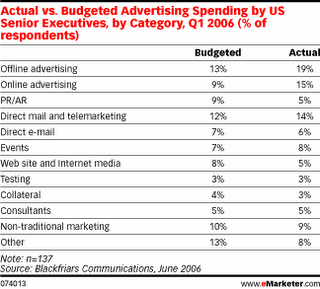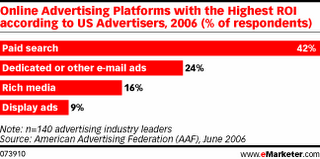Marketing Budgets Up 46% for Q2
Talk about mixed blessings! Budgets are up but spending is down? I was very dissapointed to read that the budget to spending number for PR/AR was so off. Consistantly one of the best values not spending what's budgeted for PR is just sick in my view.
Seriously, I suspect that this picture will change in Q3 and Q4 as "catch-up" spending takes hold. It would kill me to think that marketers are "less than confident about the effectiveness of marketing on their bottom line"...given today's bank of marketing knowledge, tools and talented people if there are marketers that feel this way they should simply get out of marketing.
Have a read for yourself.
Budgets are up but actual spending is off?
By Ben Macklin - Senior Analyst
Marketing research consultants Blackfriars recently announced that they have set their marketing index to 146.
What does this mean?
It means that based on a survey of 137 senior business executives between April 3 and June 1 2006, Blackfriars estimate that marketing spending is budgeted to be 46% higher in Q2, 2006 than average 2005 quarterly spending.
At the same time, Blackfriars released the Q1, 2006 marketing spending by category:

Carl Howe, principal at Blackfriars, comments on the survey findings as follows:
"Our data shows that marketing budgets and spending have gone pretty much nowhere but down over the last three years. Actual spending in Q1 2006 was about 54% of an average quarter in 2003. And while Q2 planned budgets are up significantly, the real question is not whether companies will under-spend those budgets, but rather how badly they are going to under-spend them."
The data indicates that businesses are either achieving their business objectives from their existing marketing spend, or else they are less than confident about the effectiveness of marketing on their bottom line ie they are more confident allocating resources to sales or technology or other elements of the business.
So what is the importance of marketing? Carl Howe gives a lesson in marketing at his blog.
Here is a summary:
Marketing's role is to identify what customers want and to serve those customers at a profit. So if businesses are under-spending on marketing they are not indentifying the right customers as much, they are providing less of what customers want and they won't be as profitable as they could be. So if you are 'under-spending' on marketing, you are doing your business a disservice. According to Blackfriars' predictions the US economy is likely to suffer a downturn in the next 12 months as a result of marketing under-spending.
There seems to be something a trifle odd about the concept of 'under-spending'. At what point does a company know when it has reached its optimum marketing spend – when it spends what is bugeted? I would have thought a more useful measure is whether one's business objectives have been achieved, either in the short or longer term. If this is true, then the relationship between what is bugeted for, and what is actually spent is, in isolation, (without taking account of how the overall business is doing in terms of revenues, growth, profit etc), not that revealing.
But whether there is any relevance between budgeted spending and actual spending, the fact remains that actual marketing spending has been relatively flat over the last two years. One positive sign that Blackfriar's reveals is that online marketing continues to grow strongly as a proportion of overall marketing spend.
If return on investment (ROI) is the primary criteria for businesses to advertise and market then paid search provides the highest ROI among online advertising platforms, according to an American Advertising Federation survey of 140 US advertisers.







<< Home